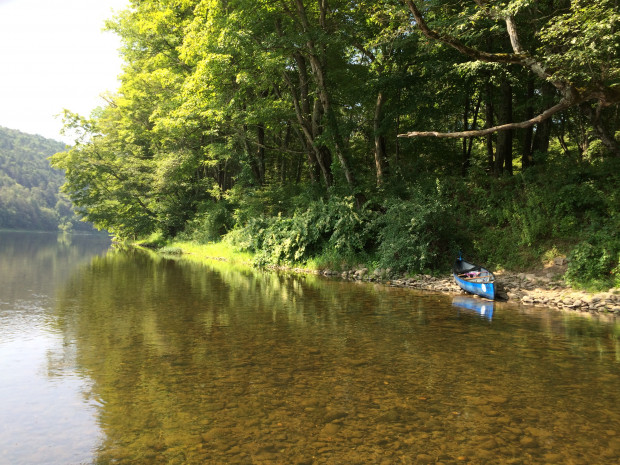AP: DRBC planning to propose permanent fracking ban
-
Susan Phillips

Catalina Jaramillo / StateImpact Pennsylvania
The Delaware River on the Pennsylvania side at the Delaware Water Gap. The Delaware River Basin Commission plans to propose a permanent ban on fracking, according to an AP report.
The Delaware River Basin Commission plans to propose a permanent ban on fracking, according to a report by the Associated Press. The AP cited an anonymous source within the DRBC, who said the agency planned an announcement on Friday. DRBC spokesman Clarke Rupert, would not comment other than to refer to the official DRBC agenda for its September 13 public meeting, which does not include a reference to gas drilling.
The five-member commission has been reviewing whether or not to allow the controversial natural gas drilling process along the Delaware River for several years. The ban would include Marcellus Shale gas drilling in Pike and Wayne counties in Northeast Pennsylvania. New York has already imposed a shale gas drilling ban.
Maya van Rossum with the Delaware Riverkeeper Network pushed for a moratorium and has been advocating for a permanent ban on fracking since 2008.
“Translating our moratorium into a ban is just…it’s rewarding beyond words,” she said.
The industry group Marcellus Shale Coalition, criticized the proposal, saying it would benefit OPEC, and hurt U.S. ratepayers.
“We strongly encourage DRBC to make sound policy based on facts and science, not politically-charged hyperbole.” said Marcellus Shale Coalition president David Spigelmyer.
Abundant shale oil production, mostly from Texas, has put pressure on OPEC’s pricing. The Marcellus Shale in Pennsylvania produces natural gas. Parts of Susquehanna and Bradford counties in Northeast Pennsylvania host highly productive wells. But it’s unclear how much natural gas is buried beneath Pike and Wayne counties.
The Delaware River Basin Commission consists of governors from the four states, and the federal government is represented by the Army Corps of Engineers. The DRBC manages water quality, withdrawals, droughts, floods, conservation and permitting for the river and its tributaries. It’s funded by the states, the federal government, permit fees, fines, as well as public and private grants.
Pennsylvania Gov. Tom Wolf voiced support for a ban on fracking in the Delaware basin during his campaign for governor, and a spokesman says his position has not changed. His predecessor Gov. Corbett, supported drilling in the Delaware basin.
While the shale gas boom took off across the rest of the state, drilling along the Delaware in Pike and Wayne counties was mired in controversy and stalemates.
In May of 2009, then-DRBC executive director Carol Collier issued an “Executive Director Determination” that all natural gas production activity in the basin needed to be reviewed by the Commission. Collier was concerned about the water withdrawals needed for drilling as well as the impact on water quality from the drilling practice known as “hydraulic fracturing,” or fracking. In May 2010 the five Commissioners voted unanimously to hold off on any decisions regarding drilling in the Basin until new regulations were adopted.
The de-facto moratorium imposed by the Commission prevents drilling for natural gas until the DRBC establishes its own regulations for gas drilling. The gas industry has cried foul, saying the DRBC is overstepping its authority. A group of landowners in Wayne County sued but a federal judge recently dismissed their claims.
In December of 2010, the DRBC released its proposals. The DRBC then held public hearings and got an unprecedented response from both sides of the issue.
After reviewing more than 60,000 public comments, the DRBC posted its revised draft regulations online in early November, 2011. Environmentalist groups, such as the Delaware Riverkeeper Network, criticized the draft rules and continued to lobby for a more extensive environmental impact study. Environmentalists said the new rules did not go far enough to protect drinking water supplies. They planned a large demonstration and civil disobedience at a scheduled November 21, 2011 meeting where the DRBC was scheduled to vote on the new rules.
But just days before that meeting, Delaware Governor Jack Markell announced his intent to reject the proposed rules. Like the environmentalists, Markell wanted the DRBC to conduct an environmental impact study before drafting new regulations. With Pennsylvania, under Gov. Tom Corbett, and New Jersey, with Gov. Chris Christie, likely to approve the new regulations, that put the federal government in the position of casting a deciding vote. But before hundreds of protestors descended upon Trenton, NJ, the divided Commission canceled the meeting, and to this date, has yet to revisit the subject in a public forum.
Delaware’s newly elected governor Chris Carney, did not return requests for comment. Neither did New York Gov. Andrew Cuomo or New Jersey Gov. Chris Christie.
















